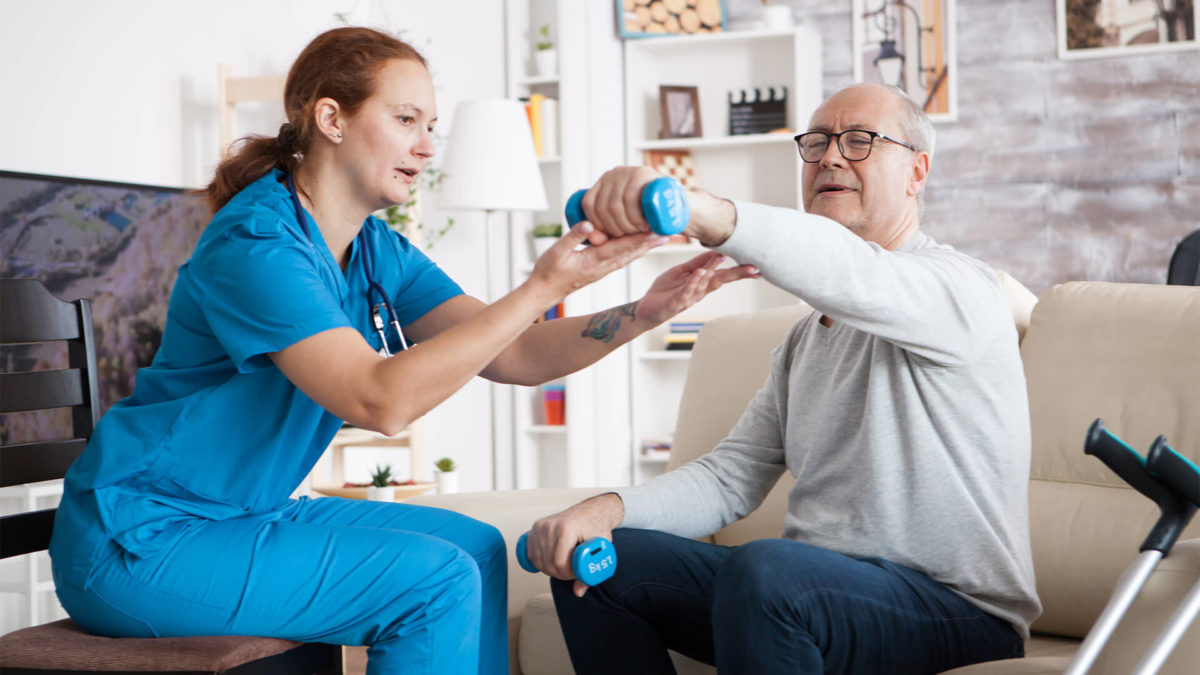True love can happen at any age.
Jay’s wife died 12 years ago, however they had separated many years before her death. Just when everyone thought Jay would “die alone”, he found “the one” just two weeks after moving into a long-term care home.
“Rose is a special woman,” gushed Jay to his family and friends. “I never really thought I could fall for someone after 50.”
Actually, everyone knew Jay met someone before he started talking about her. He started buying flowers, paying much more attention to his looks, and always had a smile on his face. These are all telltale signs to indicate that someone is in love.
Doing all kinds of romantic things with Rose makes Jay feel young again; however, there is one topic that can’t be avoided, especially with elderly lovers: SEX. This has been bothering Jay for a while.
“We love cuddling naked and fondling one another, but I can’t stop thinking about how old I am,” continued Jay, shyly.
“We have a couple age-related concerns when it comes to sex, but it is a little embarrassing mentioning it to others. An 80-year-old man wanting to have sex? It would make people’s jaws drop!”
It’s not uncommon that Jay possesses such a thought. Sex is a relatively sensitive topic itself. However, people more so tend to intentionally ignore the sexual needs of the elderly because it is uncomfortabl. This is why some seniors feel embarrassed to even put it on the table.
There are some beliefs about sex in seniors that are commonly held by society, and not all of them are true.
Common Beliefs of Sex in Old Age. What’s Wrong & What’s Right?
Wrong:
-
Sex Is For the Young
It is right that sexual functioning declines after middle age, but sex is never just for young people to enjoy. In fact, a study at Duke University has shown that 30% of married couples over 75 years old are still sexually active.
-
Old People Are Not Interested In Sex
Human sex interest can start as early as age 10 to 12, and last throughout life. In fact, according to statistics from the same study, 50% of 80-year-olds still have moderate libido.
Right:
-
There Are Physical Restrictions
Changes in physical conditions after you age does limit your sex performance and safety. For women, a change in hormone level in old age will cause the vaginal walls to become thinner and drier, and thus more prone to viruses and bacteria. For men, erectile dysfunction is common in old age. Losing feelings in the genital area and a decrease in sex drive will happen when humans hit a certain age, and it is completely normal.
-
There Will Be Emotional Barriers
In men, the most common emotional barrier is worrying about sexual performance. While in women, the most common concern is body image and a fear of being unattractive to their partners. The effect of psychological barriers are still less than the impact of physical challenges, which will further decrease the chances of having a satisfying sex life.
However, having challenges doesn’t mean that good sex doesn’t exist after you enter old age. We at CareStory did our research, and found some pointers to overcome these challenges, and help you to have a healthy sex after 60!
How To Overcome Challenges
-
Nutrition and Exercise
When it comes to intense feelings from sex, no matter if you are male or female, it’s all about blood flow. Some foods containing antioxidants, such as dark chocolate, can boost your blood circulation and give you stronger feelings of arousal. Also, exercising three times a week can greatly enhance your stamina and libido. So, stop being a couch potato! Step foot in a gym and get active!
-
Use Non-Penetrating Methods
Sex without intercourse can still be considered “good sex”. Skin on skin touching or doing full-body massages can also provide satisfying sensations. This especially works for women. Clitoral stimulation, for example, can help most women reach orgasm. Teasing and exploring each other’s bodies can also ignite the joys of sex.
-
Explore More Positions
Diseases such as arthritis causes pain and can make many sex positions uncomfortable. So, it is important to discover more positions with your partner that help to alleviate pain but also allow you to be active.
-
Speak To Health Care Providers (Family Doctor, Sex Therapists)
Some of your health care providers, such as your family doctor or a nurse, might not bring up the topic themselves. You need to prepare your concerns or questions and display them in from of them. It’s best to bring your partner with you on an appointment so that the health provider can determine what causes the issues and how to avoid them.
If they can’t provide useful suggestions, ask them to refer you to a family therapist or a sex therapist. there are always solutions to your problems.
-
Communicate With Your Partner
Whether you are with your lifelong partner or a new partner, communication is always the key! You can talk about your concerns, desires, and boundaries with your partner and exchange ideas. Try not toset too many expectations and definitely don’t judge your partner. You can add a little humor to the conversation and make the whole process more comfortable and relaxing.
-
Build Confidence
Having wrinkles and knee problems might intimidate you from enjoying good sex, but who doesn’t get old in this world? You are more sexually experienced as you get older, and this is your privilege! So embrace your experience, discard your self-doubt, and don’t forget to encourage your partner to do the same!
Safe and Better Sex
-
Use a Condom and Lubricant
Lubrication is especially important for older women who suffer from vaginal dryness. Condoms also have lubricants. To make sex more enjoyable, simply use lubrication and condoms to enhance the experience. Also, condoms can reduce chances of contracting STIs such as HIV, HPV, herpes, and trichomoniasis, which are more transmittable in seniors due to compromised immunity.
-
Foreplay
Lack of foreplay can make it harder for you to enjoy sex, which you have probably heard. So tease and kiss your partner’s body in a gentle way, and take it slow. Foreplay will relieve your tension and fatigue, and is specifically essential in female arousal.
-
Use Sex Toys
With or without a partner, a decent sex toy can do wonders for you to set the mood and experience maximum pleasure in sex. For the most part, some soft, lightweight, and ergonomic devices work well for the elderly. A vibrator or a massager will greatly increase your interest in sex, and help you to reach climax in an easier and safer way.
-
Use Your Month or Hands
Sex isn’t always about penetrative intercourse. Outercourse (sex without penetration), on the other hand, can elicit an orgasm even easier because of its lack of warmth, pressure, and wetness. In some cases, oral sex might be suitable for some seniors since it can add wetness to the whole process, but hand jobs can also give you and your partner strong sensations. Don’t be afraid to share what feels nice with your partner!
-
Sexual Positions
As we have said before, some physical or mobility issues will hamper you from having an enjoyable sexual experience. So, try sexual positions that can decrease stress on the knees and back. Here, we recommend missionary and spooning positions, which are less aggressive than many other positions.
-
Explore Erogenous Zones
As we grow older, our erogenous zones may change places. Let go of the assumptions about where you’re “supposed” to experience stimulation. Instead, try touching different spots to observe how you or your partner respond. Trust us, this could be a new form of “body language” to communicate with your partner.
Although people in old age still has a sex drive, some seniors with dementia can be overly interested in sex, which is called “hypersexuality”. Seniors with cognitive impairment may demonstrate inappropriate sexual behavior and cause distress in both family members and caregivers. Here, CareStory has summarized some common inappropriate sexual behaviors you may see in seniors with dementia.
Sexual Expression and Dementia
-
Behaviors Expressed Publicly Without Regard For Others
Some seniors with dementia will masturbate or behave sexually in public since the change in brain function causes a lack of control of urges. Sometimes, it can also be attributed to tight clothing or the hot temperature of a room.
-
Misinterpreting Touches, Smiles, and Hugs as Sexual Invitations
Some intimate behavior can deliver the wrong messages to seniors with dementia since, again, the disease will change how the person understands other people’s behaviors and actions.
-
Sexual Acts With Someone Who’s Not Their Spouse.
It is usually hurtful for a spouse with dementia to see their loved one act like a stranger. But what’s even more frustrating is when their loved one behaves sexually toward caregivers or other residents around him or her. Note that this kind of behaviour does not reflect ttheir “true identity”. People with dementia will sometimes interpret sexual behavior as a way to communicate, so try not to be too upset about it.
Your Loved One Has Dementia and is Demonstrating Hypersexuality – Now What?
If your loved one has dementia and expresses the above inappropriate behavior, we, as their family, need to be responsible for it. So – how do we intervene?
-
Use a Calm and Firm Tone of Voice
People with dementia are sensitive to your tone, so stop them by using a calm voice without being judgemental or scolding. See our blog post on “How To Communicate With Seniors” for more details.
-
Call Their Preferred Names to Get Attention
Calling your loved one by their preferred name is a way to grab their attention, reminding them that they are not forgotten. Also, calling them by their preferred name gives them reassurance and thus calms them down. CareStory offers a function that records your loved one’s preferred name and shares it with caregivers.
-
Use Distractions
Just like calling their preferred name, a distraction in the form of other activities can provide your loved one with comfort and keep their hands busy. You can show your loved one family pictures or give him or her a stuffed animal for cuddling and petting. It will greatly relieve stress and satisfy their need for warmth.
-
Take Them to a Private Environment
When your loved one’s behavior seems “unstoppable”, remove them from the scene and provide privacy. Sometimes your loved one’s behavior indicates that they are in need of using the bathroom, so take them to a nearby washroom and see their reaction.
-
Eliminate Triggers
Magazines, TV shows, or other forms of entertainment may all contain visual triggers for your loved one’s ihypersexuality. Sometimes, intimate acts such as touching, hugging, or kissing also can be misunderstood. Make sure to be aware of your body language and have clear boundaries.
At The End
Sex should never be perceived as an embarrassing topic no matter what your age is. Be true to your needs and don’t be afraid to share your ideas with your partner – your sexual needs are an important part of your routine. However, as for those with physical restrictions, it is encouraged to find other ways to have safe sex and consult with professionals.
References:












